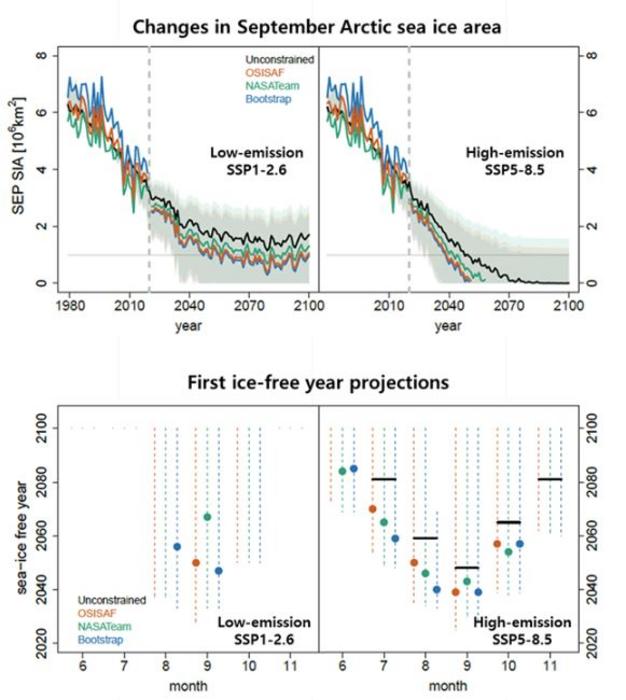If the world keeps increasing greenhouse gas emissions at its current speed, all sea ice in the Arctic will disappear in the 2030s, an event that could at best be postponed until the 2050s should emissions be somehow reduced. The prediction is a decade earlier than what the Intergovernmental Panel on Climate Change (IPCC) has projected: an ice-free Arctic by the 2040s.

Credit: POSTECH
If the world keeps increasing greenhouse gas emissions at its current speed, all sea ice in the Arctic will disappear in the 2030s, an event that could at best be postponed until the 2050s should emissions be somehow reduced. The prediction is a decade earlier than what the Intergovernmental Panel on Climate Change (IPCC) has projected: an ice-free Arctic by the 2040s.
A possible ice-free Arctic in the 2030-2050s was projected regardless of humanity’s efforts to reduce its greenhouse gas emissions by Professor Seung-Ki Min and Research Professor Yeon-Hee Kim from the Division of Environmental Science and Engineering at Pohang University of Science and Technology (POSTECH) and a joint team of researchers from the Environment Climate Change Canada and Universität Hamburg, Germany. The research was published in the international journal, Nature Communications.
The term global warming has become a household name since it was first used by a climate scientist at NASA in 1988. The Earth has seen a rapid decline in the Arctic sea ice area as its temperature has increased over the past several decades. This reduction in Arctic sea ice has induced the acceleration of Arctic warming, which is suggested to contribute to the increased frequency of extreme weather events in mid-latitude regions.
To predict the timing of Arctic sea ice depletion, the research team analyzed 41 years of data from 1979 to 2019. By comparing the results of multiple model simulations with three satellite observational datasets, it was confirmed that the primary cause of the decline is attributed to ‘man-made greenhouse gas emissions’. Greenhouse gas emissions resulting from human fossil fuel combustion and deforestation have been the primary drivers of Arctic sea ice decline over the past 41 years, while the influence of aerosols, solar and volcanic activities has been found to be minimal. Monthly analysis found that increased greenhouse gas emissions were reducing Arctic sea ice all year round, regardless of season or timing, although September exhibited the smallest extent of sea ice reduction.
Furthermore, it was revealed that climate models used in previous IPCC predictions generally underestimated the declining trend of sea ice area, which was taken into account to adjust the simulation values for future predictions. The results showed accelerated decline rates across all scenarios, most importantly confirming that Arctic sea ice could completely disappear by the 2050s even with reductions in greenhouse gas emissions. This finding highlights for the first time that the extinction of Arctic sea ice is possible irrespective of achieving ‘carbon neutrality.’
The accelerated decline of Arctic sea ice, faster than previously anticipated, is expected to have significant impacts not only on the Arctic region but also on human societies and ecosystems worldwide. The reduction of sea ice can result in more frequent occurrences of extreme weather events such as severe cold waves, heat waves, and heavy rainfalls all across the globe, with the thawing of the Siberian permafrost in the Arctic region possibly intensifying global warming further. We may witness terrifying scenarios, which we have seen only in disaster movies, unfold right before our eyes.
Professor Seung-Ki Min, who led the study, explained, “We have confirmed an even faster timing of Arctic sea ice depletion than previous IPCC predictions after scaling model simulations based on observational data.” He added, “We need to be vigilant about the potential disappearance of Arctic sea ice, regardless of carbon neutrality policies.” He also expressed the importance of “evaluating the various climate change impacts resulting from the disappearance of Arctic sea ice and developing adaptation measures alongside carbon emission reduction policies.”
The study was funded by the National Research Foundation of Korea (Mid-Career Researcher program).
Journal
Nature Communications
DOI
10.1038/s41467-023-38511-8
Article Title
Observationally-constrained projections of an ice-free Arctic even under a low emission scenario
Article Publication Date
6-Jun-2023




